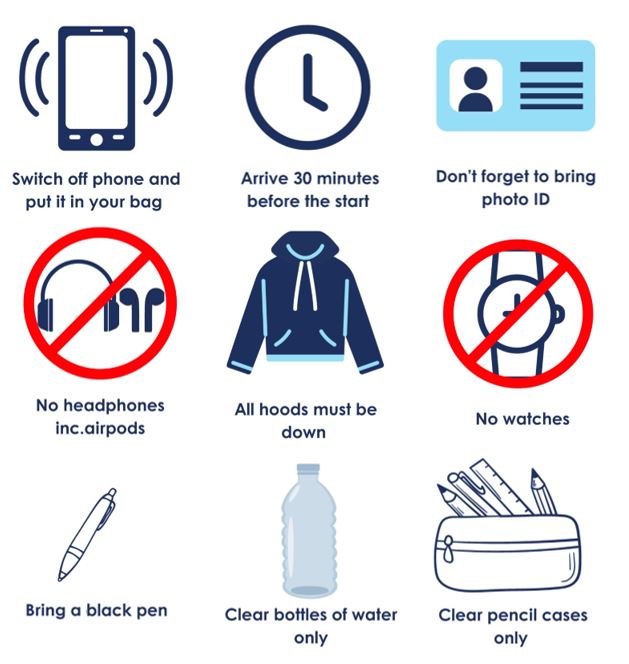Before your exam
You will be provided with an individual exam timetable (on CEDAR and a paper copy), please make sure you check the details are correct and contact exams (exams@bhasvic.ac.uk) with any queries.
If you have exam access arrangements these will be detailed on your paper timetable, in the box labelled Exam Access Arrangements (next to your photo). If you think you should have exam access arrangements and these are not listed please contact the exams office (exams@bhasvic.ac.uk).
Please note you will need to be available for the contingency day (see the contingency planning section below for further information):
24th June 2026 – Contingency day
JCQ requirements
Before your exam, you are required to read the JCQ guidelines about written exams. You will be asked to confirm you have read these, the exams department will send you an email with a link to a form to complete.
Information for candidates - written exams
Further information from JCQ can also be found on the link below.
Other information for candidates
Exam Access Arrangements
If you think you require exam access arrangements this needs to be assessed and planned in advance. Please discuss these with your tutor, who can refer you to additional learner support for an assessment of your needs. These must be confirmed and agreed before the exam. These will be taken into consideration when the exams team are planning the seating and room arrangements.
“Access Arrangements are pre-examination adjustments for candidates based on evidence of need and normal way of working. Access Arrangements fall into two distinct categories: some arrangements are delegated to centres, others require prior JCQ awarding body approval.” (JCQ,2025/26).
Clashes
All clashes of exam times will be dealt with by the exams department. We aim to ensure that any clash will be resolved by doing 2 exams on one day with supervision between each paper. The only time that alternative arrangements will be made is if you have 3 exams on one day, this is very rare and we would discuss this with you.
If you require supervision you will be informed by the exams department and will be asked to complete a form, you will be sent an email with further details.
Contingency planning
In the rare case of unforeseen emergencies/circumstances which cause significant disruption to examinations (e.g. fire, flooding) BHASVIC has contingency plans in place to ensure exams continue as ‘normal’ as possible. In addition, there is a nationwide contingency day in the event of national or significant local disruption to examinations, you must be available for this day. The decision to use this day is made by the awarding bodies, not BHASVIC. If you choose not to be available on this day and it is implemented, then you will not be eligible for any enhanced grading arrangements (unless covered by special consideration for a different reason – see below regarding special consideration).
24th June 2026 – Contingency day
On the day of the exam
Things to remember
- Individual timetable/seating plan
- BHASVIC ID/Lanyard
- Correct equipment, black pen, pencil, rubber & calculator, if permitted, (in a clear pencil case or bag).
- No gel pens, correction fluid, or corrections pens.
- Allow plenty of time before the start of the exam to drop off your bags etc.
- You may bring wallets/purses/money and keys into the exam room and place them on the floor under your desk.
- Do not bring valuables into college as the college will not take responsibility for lost or stolen items.
- Coloured metal or plastic water bottles will not be allowed in the exam room. Only clear water bottles with the labels removed will be allowed in the exam room.
- You must not bring a watch, mobile phone or any other electronic communication device into the examination room. Calculator lids must be left in your bag. This applies to all equipment that may activate and make a noise. The safest way to avoid this is not to bring these items into college. If you must have a mobile phone with you on the day, there will be a system to collect it before the start of the exam.
- You may not wear any form of headwear unless for religious reasons.
- If for any reason you are either delayed, or unable to attend the exam, inform the college as soon as possible, using the exams office direct line number – which is 01273 859806. If you are late, on your arrival at college go to the Exams office in room S212, on the first floor of the sports centre.
- If you are entitled to extra time, this will not show on your Seating Timetable. The invigilator will amend your finish time at the start of the exam.
- You must remain quiet at all times whilst in the exam room and remember when you leave the room please do so quietly so as not to disturb others who may still be working.
- Invigilators are there to help you, listen to their instructions carefully, and be polite.
- You must arrive at least 30 minutes or more before the start time for all exams.
- Ensure you have read the JCQ Information for candidates documents on the JCQ website.
- On receipt of your seating timetable if you have any questions please come to the Exams office in room S212, on the first floor of the sports centre
Finally, good luck!!
Delayed or unable to attend
Please inform the college as soon as possible using the Exams office direct number 01273 859806.
If you are late, on your arrival at college go to the Exams office in room S212, on the first floor of the sports centre – don’t panic!
If you are unwell you will have to provide a doctor's note if you want the exams office to apply for special consideration (see below).
If you are unwell during the exam
Please raise your hand and tell an invigilator, they have a range of ways to support you. After the exam, they will inform the Exams office, who may be able to apply for special consideration on your behalf (see below).
Special Consideration
If you feel that something on the day or in the days leading up to your exam has negatively impacted your ability to undertake the exam you must inform the Exams office as soon as possible. Deadlines for this are dependent on the circumstances but to ensure this is submitted on your behalf in a timely manner please inform the exams office within 5 days of your last affected exam(s). You may be asked to provide evidence, such as a doctor's note.
Please note you cannot apply for this consideration directly it must be submitted by the Exams office.
The exam boards do not give any information about the % mark change which has been applied, however the maximum is 5% and that would only be applied if the circumstances were exceedingly severe, such as a direct family bereavement.
Summary of JCQ guidance
(A guide to the special consideration process - General and Vocational qualifications, JCQ, Sept 2025)
Special consideration is given to a candidate who has temporarily experienced illness, injury or some other event outside of their control at the time of the assessment. It is applied when the issue or event has had, or is reasonably likely to have had, a material effect on a candidate’s ability to take an assessment or demonstrate his or her normal level of attainment in an assessment.
The categories for a special consideration application are as follows:
- temporary illness or accident/injury at the time of the assessment;
- bereavement at the time of the assessment (where whole groups are affected, normally only those most closely involved will be eligible);
- domestic crisis arising at the time of the assessment;
- serious disturbance during an examination;
- accidental events at the time of the assessment such as being given the wrong examination paper, being given a defective examination paper or CD, failure of practical equipment, failure of materials to arrive on time;
- participation in sporting events, training camps or other events at an international level at the time of the assessment, e.g. representing their club or country at an international level in chess or football;
- failure by the centre to implement previously approved access arrangements for that specific examination series.
Special consideration cannot be applied for if the exam is affected by:
- long term illness or other difficulties (this might be covered by Exam Access Arrangements, see above but must be applied for before the exam)
- bereavement occurring more than six months before the assessment, unless an anniversary has been reached at the time of the assessment or there are on-going implications such as an inquest or court case;
- domestic inconvenience, such as moving house, lack of facilities, taking holidays
- minor disturbance in the examination room caused by another candidate, such as momentary bad behaviour or a mobile phone ringing;
- the consequences of committing a crime, where formally charged or found guilty;
- the consequences of taking alcohol or recreational drugs;
- the consequences of disobeying the centre’s internal regulations;
- the failure of the centre to prepare candidates properly for the examination for whatever reason;
- quality of teaching, staff shortages, building work or lack of facilities;
- misreading the timetable and/or failing to attend at the right time and in the right place;
- misreading the instructions of the question paper and answering the wrong questions;
- making personal arrangements such as a wedding or holiday arrangements which conflict with the examination timetable;
- submitting no coursework or non-examination assessment at all.
- missing all examinations and internally assessed components/units;
- failure to cover the course because of joining the class part way through;
- a disability or learning difficulties (diagnosed or undiagnosed) unless the disability or circumstances exacerbate what would otherwise be a minor issue at the time of the assessment, i.e. difficulties over and above those that previously approved access arrangements would have alleviated;
- failure by the centre to process access arrangements by the published deadline.

